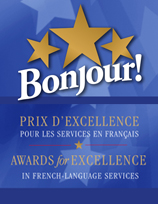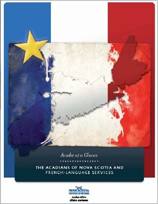Acadian Affairs provides services and programs to provincial government institutions to support the development and delivery of French-language services to the Acadian and francophone community. These include translation, French language training, funding, policy and communications advice, and the Bonjour! visual identification program.
Acadian Affairs also supports the community through two programs it administers, which provide funding for cultural projects in Acadian and francophone communities and for community organizations in Nova Scotia wishing to carry out exchanges or collaborate with organizations in Québec.
Services and Programs for Government Institutions
Bonjour! Program

The Bonjour! program is a visual identification program used by the Government of Nova Scotia. Displaying the Bonjour! logo indicates that services are available in French. Bonjour! signage provides a welcoming invitation to French-speaking Nova Scotians to ask for and use government services in French. Within government, the program encourages French-speaking employees to actively offer services in French.
The Bonjour! program materials include desktop signs, posters, language tools, and lapel pins to identify French-speaking employees. There is also a Bonjour! web mark for government websites that offer information and services in French. Materials are available to Nova Scotia government institutions free of charge.
Government institutions can contact Acadian Affairs to order materials.
Bonjour! Awards for Excellence in French-language Services

The Bonjour! Awards recognize the outstanding contributions of provincial government employees to the development and delivery of French-language services and programs.
Individual employees or groups from any government department or designated public institution that provides French-language services can be recognized with a Bonjour! Award. The Awards also play a role in encouraging public servants to develop and deliver services in French.
Nominations are accepted from members of the public and government employees. Learn more about the Bonjour! Awards, including the selection process, nomination categories, eligibility, and how to submit a nomination.
See a list of past Bonjour! Award recipients.
Translation Services
Professional translation services are available for government departments, agencies and other designated public institutions. From translation to proofreading and terminology services, Communications Nova Scotia’s team of professional translators enables the delivery of information and communication in French. Translation services are called upon by Government for a wide range of material, including: brochures, application forms, website content, signage, reports, advertisements, correspondence and news releases.
Government institutions can contact Communications Nova Scotia to access translation services.
French Language Training
Office of Acadian Affairs and Francophonie (OAAF) coordinates and funds French language training to help government of Nova Scotia strengthen its capacity to deliver services in French. French language courses, from beginner to advanced, are offered to government employees four times per year in specific locations in collaboration with Université Sainte-Anne. Additionally, specific requests, for example, Health Care courses are also offered through Alliance Française Dartmouth-Halifax.
Nova Scotia Government employees can get registration information for French language training on the Learning Environment, from their departmental French-language services coordinator or the Office of Acadian Affairs and Francophonie.
To obtain detailed information on the PSC_CLC_French Language Courses/ Cours de français click here.
Acadie at a Glance Workshop

This one-day workshop is an opportunity for government employees to learn about the Acadian and francophone community and French-language services in Nova Scotia. Acadian Affairs offers Acadie at a Glance several times a year in both English and French. Through the workshop, participants will gain a better understanding of the cultural identity and heritage of Acadians and francophones, the French-language Services Act and government’s role in supporting the Acadian and francophone community.
Nova Scotia Government employees can get registration information for the Acadie at a Glance workshop on the Learning Environment or from their French-language services coordinator.
Funding for French-language Services
The Canada–Nova Scotia Agreement on French-language Services provides federal funding to help Nova Scotia develop and deliver French-language services. Departments and other designated public institutions can recover up to 50% of eligible project costs.
Government institutions can contact Acadian Affairs to apply for funding.
Programs to Support the Community
Acadian Heritage Month – Starting in August 2024, Acadian Heritage Month will be celebrated annually in Nova Scotia, honouring more than 400 years of Acadian history, culture, language and traditions.
Funding for Acadian Heritage Month supports projects that celebrate Acadian heritage. The theme for Acadian Heritage Month 2025 is: Honouring Acadian heritage, shaping the future. Please consult the guidelines for more information on funding streams and criteria.
You need to apply by May 23, 2025.
The funding program processes applications as they receive them until all available funds are allocated. Once funds are allocated, the program closes and no longer accepts new applications for the year.
- Guidelines (PDF)
- Application form (PDF)
- Application for funding (MS Excel)
- Final report template (MS Word)

The Vive l’Acadie Community Fund supports cultural projects in the Acadian and francophone community. It is funded through the donations collected from the purchase and renewal of the Acadian flag licence plate. Motorists can show their pride in Nova Scotia’s Acadian heritage while also proudly supporting their culture. One hundred percent of the donations collected go back to the communities where they originated. Funds are distributed by Acadian Affairs to regional community organizations who submit projects for funding. Visit the Service Nova Scotia and Municipal Relations website to learn more about the Acadian flag licence plate.
See the list of regional community organizations who receive the donations collected in the Vive l’Acadie Community Fund.
The Acadian and Francophone Community Projects program funded through the Office of Acadian Affairs and Francophonie supports a wide variety of activities from the Acadian and Francophone community of Nova Scotia.
This program supports projects in various sectors like language, culture and youth.
You need to apply by 12 December 2025. The funding program processes applications as they receive them until all available funds are allocated (gone). Once all funds are allocated, the program closes and no longer accepts new applications. NEW! Please note that the amount requested to the Office cannot exceed 80% of the total amount of the project. In addition, the amount requested to the Office cannot exceed $25,000. For more information, consult the guidelines.
Programme d’appui à la francophonie canadienne (PAFC) falls under the Agreement for Cooperation and Exchange between the Government of Québec and the Government of Nova Scotia with Respect to the Francophonie. This program offers matching funding to support French-language exchanges and cooperative projects between Canadian francophone community organizations in both provinces. Projects in the following action areas will have priority: education and early childhood, culture and heritage, communications, immigration, and tourism and economy.
Learn more about the program by visiting the Secrétariat du Québec aux relations canadiennes website (available in French only). Interested community organizations in Nova Scotia can contact the Office of Acadian Affairs and Francophonie to discuss potential projects.
To submit a funding request, you must register as a partner organization with the Secrétariat du Québec aux relations canadiennes and complete the online application form (available in French only).
You need to apply by 27 June 2025.
